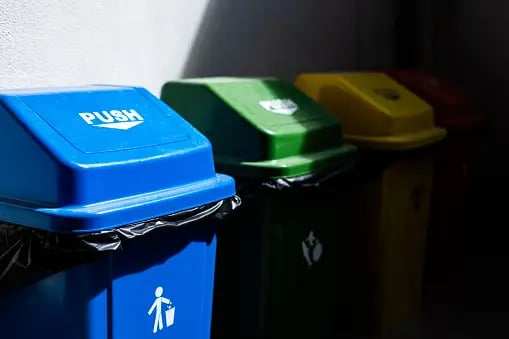
The consultations published last December by DEFRA and the Treasury have a deadline for submissions of May 12th and 13th. They concern how England should manage its waste collections and treatment; how the UK should manage its packaging waste; and how the UK should tax plastics. Within the scope of the consultations on packaging waste, the Government is consulting on two questions- how to make the producers pay for all the costs of managing the waste they create (known as Extended Producer Responsibility or EPR). In the UK our EPR system only covers approximately 10% of the cost of managing the waste of items put on the market, leaving the other 90% of the costs falling on our Local Authorities. This is very different from the ‘Green Dot’ system adopted across Europe that covers full costs. The other question being asked is whether and how to introduce a deposit-return scheme (DRS) for drink containers (bottles and cans) to reduce littering and increase recycling.
The consultations have created a new industry- the consultations conference industry! All over the UK professionals who have anything to do with remotely concerned with packaging, waste and the food/retail industries, have been racing around talking to one another and trying to find common ground, understand the evidence, position themselves and their businesses.
DEFRA has made it clear it wants to move on a trajectory that simplifies collections and creates consistency across the nation; increases the amount of money put into collecting and recycling all waste whether that is funding from central Government or from taxes on packaging and plastics; reduce plastic waste; send zero food waste to landfill by 2030; simplify labelling to ease the messaging to the public; and introduce benchmarking and service performance criteria to ensure councils meet minimum standards.
It must be hard at times to be a civil servant. Whilst they are striving for simplicity, uniformity and consistent standards, ensuring the new system is funded and resilient, most stakeholders involved are fighting for their solution; councils are arguing that their waste collection systems are the best (for sure better than the council next door) ; those involved in food waste are arguing about how it is collected and treated; glass recyclers want glass collected separately; paper recyclers want paper collected separately; the plastic industry is fighting against taxes and everyone else; the retailers are moaning that this will all cost them more. So, whilst DEFRA recognises that the current system is not working (recycling levels are falling and we are sending millions of tonnes of food waste to landfills still), everyone seems to be replying “the system is not working because what I want has not been adopted”.
Well, this is, of course, a bit of an exaggeration, we have been among those racing around the country attending meetings and listening and talking to stakeholders across the economy. What has impressed us most is a genuine desire to make change happen now, as everyone realises the system is malfunctioning and that with Michael Gove leading the charge, this is a once -in- a- lifetime opportunity of designing a resource and waste system future-proofed for the next decade. Indeed, we have targets of 65% recycling to meet in 2035 – it seems a long way away, but in terms of investing to build infrastructure, it is not. And with renewed rules on what we deem to be recycled, our existing recycling rates are around half of the target.
Key issues from the talks we have had
- FOOD WASTE: should it be collected separately or where possible with garden waste as currently in many councils in less urban areas? Will this create confusion and obstruct consistency, or will it ensure higher levels of food waste recycling? If collected separately should food waste be presented in compostable bags to avoid plastic polluting the waste stream? Should anaerobic digestion producing biogas be given preferential status over composting?
- OTHER WASTE: should packaging be collected in a simplified “one bin” commingled system? This would dramatically facilitate collections and ease communications to householders “if it is plastic, a tin can, a glass bottle, paper or cardboard, chuck it in the one bin” Great (for the producer). But, smashed glass ruins paper and plastic recycling; plastic if contaminated with food (such as films) contaminates everything else; clean paper/cardboard has a market value whilst wet and contaminated doesn’t. Do we need a one bin or four bins? And how do we measure performance standards if we leave every council to decide? Should the focus be on what materials can be collected, or should there be more consideration given to the quality and destination of the recycled materials that are produced? There have been huge investments in treatment technologies, collection vehicles, as well as long term PFI contracts built around the ‘source segregated and ‘one bin’ solutions. Whichever option is agreed upon someone is going to be unhappy.
- EPR: which system should we create to manage a flow of funds likely to rise from around £150m today to £1.5bn in five years’ time? Should this be a central Government managed system or one left in the hands of producers, or even in the hands of the current compliance companies managing PRNs? Who would head up the new EPR Government body, and would they be given new enforcing powers, or would it be down to the Environment Agency to police? Given the fraud in the system today, a consensus around some form of centralised systems seems to be growing. Should the net for EPR be thrown wider with an aim to capture items sold by smaller retailers and producers? For sure retailers are saying loud and clear that they want a say in how the money they give is spent. And the major FMCG companies pumping billions of packaging products onto the market every day are not sitting back waiting for this to hit them but are working on strategies that will share the cost as widely as possible. Who would get to decide how this £1.5bn would be reallocated? Would those that have already heavily invested in good waste infrastructure be overlooked to bolster up those that haven’t been so proactive; or would struggling regions be left to fall behind?
- DRS: what should be included? All drinks containers including glass? Or just plastic bottles and tin cans? And up to what size, is this just up to 500ml ‘on the go’ items? Would it need to exclude larger ‘domestic packaging’ like milk containers? If you think about a lot of the drinks you buy, then you would probably need to include bottles up to 2 or 3 litres; you might not want to include glass because it can smash and is easy to collect from the kerbside. Would ‘multi-pack’ drinks excluded as they’re not ‘on the go’? And how much should the deposit be? 10p, 20p, 50p? On a sliding scale according to size or according to the material? Would Local Authorities begin to lose rebate revenues from not being able to resell higher value streams such as aluminium cans and tin cans? Where would all these DRS machines be situated, how much money and energy will it take to empty them and keep them running?
- PLASTIC TAX: The Treasury’s proposes to tax plastic packaging that does not have at least a 30% recycled content. The aim is to drive up the demand for recycled plastics, reduce the demand on virgin materials and increase overall collection and recycling. What level of infrastructure would be required to produce this material? Would its quality meet the necessary specifications, such as food safety standards? It has even been suggested that the percentage of recycled content should be added to packaging, but would this really help the consumer make more informed choices, or improve recycling rates, or just add to the confusion that’s already there? Currently, there is no international methodology or standard to measure recycled content in plastics. So, what do we do? Go on trust? And imported plastic packaging is excluded- that is really a contradiction because it would penalise anyone packing here in the UK. And to what do we apply the tax? All polymers or just the plastic packaging itself? Unless the application of taxes is fair and uniform, on all plastic packaging, including imports, it will be worthless. Lastly, how much should the tax be?
Over these last weeks before the consultations close, we will be continuing the dialogue and trying to understand the best solutions for the environment and the economy. What underpins the industry is money- and the waste industry has been starved of resources for years now. We need lots more money to do things right. Once we all agree that the next question is, who pays? Then, who gets to spend it?
So when you read the responses to this strategy bear in mind that behind the answers will be above all financial as well as environmental motives.










